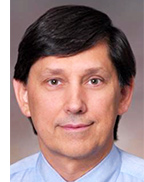Longer-term JULIET data validate the durable responses with tisagenlecleucel in adults with relapsed and refractory diffuse large B-cell lymphoma
JULIET is a single-arm, phase II trial evaluating the CD19 targeting CAR T-cell therapy tisagenlecleucel in adult patients with clinically active relapsed/refractory diffuse large B-cell lymphoma (DLBCL). Previously, JULIET demonstrated to have met its primary objective with an overall response rate (ORR) of 59%. During ASH 2018, updated results of this trial with 5 months of additional follow-up demonstrate an ORR of 54% among the 99 patients with at least 3 months of follow-up. This includes 40% of patients with a complete response (CR) to the therapy. Moreover, 64% of patients who achieved a CR earlier in the trial are currently still in remission with no detectable evidence of cancer.
DLBCL is the most common form of lymphoma, accounting for roughly one-third of all non-Hodgkin lymphoma cases. While the current treatment options are successful for many people with this disease, primary therapy fails in about one-third of DLBCL patients. Half of these patients are not eligible for an autologous stem cell transplantation (ASCT), which is considered the best second-line treatment approach. For these patients, and for patients relapsing after an ASCT, there is an unmet medical need.
The single-arm, open-label phase II JULIET trial is among the largest studies to examine a CAR T-cell therapy exclusively in people with DLBCL. In this trial, adult patients with relapsed/refractory DLBCL, who had received ≥2 lines of prior therapy (including rituximab and an anthracycline), and were ineligible for or had relapsed after an ASCT were treated with a single dose of tisagenlecleucel. Tisagenlecleucel was centrally manufactured at 2 facilities (Morris Plains, NJ, USA [main cohort] and Leipzig, Germany [cohort A]) using cryopreserved apheresis material and provided to patients at 27 treatment sites across 10 countries on 4 continents.
At data cutoff a total of 167 patients were enrolled and 115 were infused (99 in the main cohort and 16 in cohort A) with a single dose of tisagenlecleucel (median, 3.0×108 CAR-positive viable T cells). The median age of patients in the study was 56 years and 23% was 65 years or older. At study entry, 77% of infused patients had stage III/IV disease and 17% had double/triple hit disease. Fifty-one percent of patients had received ≥3 prior lines of antineoplastic therapy (range, 1-6) and 49% underwent a prior ASCT. All 99 patients in the main cohort had at least 3 months of follow-up or discontinued earlier and were evaluable for efficacy. In this cohort, the ORR was 54%, with 40% CRs and 13% partial responses (PR). The ORR was consistent across prognostic subgroups (including prior ASCT and double/triple-hit lymphoma).
The median duration of response (DoR) was not reached and the probability of being relapse free (RFS) at 6 months was 66%. At 12 and 18 months the RFS was still high at 64%. The DoR was similar by age group and by relapsed or refractory status. Interestingly, no relapses were observed beyond 11 months after infusion. The median OS for all infused patients was 11.1 months and was not yet reached for patients in CR. The OS probability was 48% at 12 months, dropping to and 43% at 18 months. Moreover, 64% of patients who achieved a CR earlier in the trial are currently still in remission with no detectable evidence of cancer. Interestingly, 54% of patients who initially had a PR ended up having a CR, which suggests that the cell product persists viably and remains active in vivo over time
Consistent with previous reports on safety, most of the severe adverse events were seen shortly after infusion and included drop in mature blood cells (34% of patients), cytokine release syndrome (CRS) (23% of patients), infection (19% of patients), and neurological events (11% of patients). There were no deaths that investigators attributed to the therapy.
References
R. Maziarz, et al. Sustained Disease Control for Adult Patients with Relapsed or Refractory Diffuse Large B-Cell Lymphoma: An Updated Analysis of Juliet, a Global Pivotal Phase 2 Trial of Tisagenlecleucel. Presented at ASH 2018; Abstract 1684.


